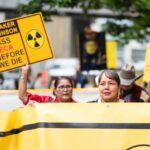The Washington Post’s distorted take on Yucca Mountain
By Hugh Gusterson | March 27, 2009
Newspapers maintain a distinction between news stories, which are supposed to be balanced and factually accurate, and editorial pages, which afford more license for point of view and factual cherry-picking. But there is still a line between responsible and irresponsible editorials. Wherever that line is, a recent Washington Post editorial on Yucca Mountain in Nevada is on the wrong side of it.
Yucca Mountain is the site selected by Congress in 1987 for burying the nation’s high-level nuclear waste, which, in the absence of a repository, is accumulating at the country’s 104 reactor sites. Yucca Mountain was supposed to accept waste from U.S. nuclear reactors by 1998. The owners of these reactors are understandably upset that although they have faithfully paid their dues to the government to fund construction of a repository, Yucca Mountain is still not close to opening. In fact, $7.7 billion later, the government has little more to show for its efforts than an access tunnel bored into the mountain–a tunnel to nowhere given that the repository itself has not been built. This is yet another example of the Energy Department’s congenital inability to bring large projects to fruition on time and on budget–but that’s a subject for another column.
Did the Post‘s writers even read up on the science before taking a position on the technical merits of Yucca Mountain, or did they decide to treat it the way the CIA treated intelligence information about Iraq in 2003?”
In 2008, Energy finally applied for a license to construct the repository, putting it on a snail-like trajectory to open–22 years late–in 2020. But that was before President Barack Obama took office. Honoring a campaign promise, Obama’s budget has put Yucca Mountain into a coma, if not killed it outright.
This column isn’t about the merits of Yucca Mountain itself. The site definitely has many problems, but so would other sites. More problems have come to light since Congress selected Yucca Mountain, but there is also something to be said for not abandoning a $7.7 billion, 22-year investment. Plus, Yucca Mountain is in the midst of a sparsely populated area that is already contaminated by hundreds of nuclear tests.
Although I have no brief for or against Yucca Mountain, I do have a quarrel with the way the Post‘s editorial board has written about the issue. It is the board’s job, while advocating a position, to inform the public on a question that has not received the public debate it deserves. Instead, while its editorial is right to lament that the country now has no plan for dealing with its high-level nuclear waste, its condemnation of the Obama decision on Yucca Mountain seriously distorts the facts.
Take this passage, for example: “There have been worries about radioactive seepage into groundwater. But scientists have long maintained that corrosion wouldn’t threaten the integrity of the storage containers for at least 10,000 years.”
To be truthful, the sentence should have read: “While scientists working for Energy and its contractors have long maintained that corrosion wouldn’t threaten the integrity of the storage containers for 10,000 years, some independent scientists have disputed that assertion.” When you say scientists agree, you close off debate. When you concede that they disagree, your case is no longer closed.
That is a sin of commission. Worse is the editorial’s sin of omission. When “reiterating our longstanding support for the Yucca Mountain facility” as the best site for the nation’s high-level nuclear waste, the Post‘s editorial board never mentions the concern that Yucca Mountain is located in a zone subject to both earthquakes and volcanic activity. Nor does it mention that while every other country building a high-level nuclear waste repository has chosen to build below the water table, the United States is building above the water table, and some experts fear this could lead to oxidation of the waste. The editorial just says that putting the nation’s nuclear waste 1,000 feet underground in an isolated area is a good idea. Did the Post‘s writers even read up on the science before taking a position on the technical merits of Yucca Mountain, or did they decide to treat it the way the CIA treated intelligence information about Iraq in 2003?
Finally, the Post accuses Obama of playing politics with Yucca Mountain: “The president keeps a campaign promise to shut the site down. By doing so, he pleases Senate Majority leader Harry Reid. And he potentially secures the swing state’s place in the blue column; the Silver State hadn’t voted for the Democratic presidential candidate since 1996 until it went to Mr. Obama in 2008.” Silly me: I had always thought that making a campaign promise, winning an election, and keeping your promise was the way a democracy was supposed to work.
While it is certainly plausible that President Obama saw the political advantage in his decision, the Post is only telling its readers half the story about the overlay of political and technical decision-making processes in regard to Yucca Mountain. Rewind to 1987: Yucca Mountain was at that time one of three geologic sites under consideration for the waste repository. Congress cut short the process of technical evaluation when, in an act of legislation known colloquially in Nevada as the “Screw Nevada Act,” legislators from other parts of the country declared their own states off limits and selected Nevada for the dubious privilege of hosting all the nation’s high-level nuclear waste. It is not, then, as if Obama has suddenly injected politics into a process that has hitherto been chastely technocratic.
In sum, the Post‘s editorial board, in its zeal to defend Yucca Mountain, have proclaimed a scientific consensus where none exists; omitted all mention of important technical liabilities of the site; and accused Yucca’s opponents of politicizing a process that had, from the start, been politicized by the site’s advocates.
Does any of this matter? Don’t we expect editorialists to behave like courtroom attorneys, omitting all the inconvenient facts and exaggerating the others? The problem with this analogy is that the courtroom prosecutor is counterbalanced by the defending attorney. But unless someone who disagrees is lucky enough to win the letters page lottery, the counterbalancing case about Yucca Mountain will not be made in the Washington Post.
If the Post had written extensively about Yucca Mountain in the past so that interested readers were already familiar with the issues and with some of the basic facts, then the distortions of this editorial might be forgivable. But a Lexis-Nexis search reveals only one other article about Yucca Mountain in the Post in the past year. In other words, for those who rely on the Post for their information, this editorial itself would be almost their only source. In such a situation, the Post has done its readers a grave disservice.
Together, we make the world safer.
The Bulletin elevates expert voices above the noise. But as an independent nonprofit organization, our operations depend on the support of readers like you. Help us continue to deliver quality journalism that holds leaders accountable. Your support of our work at any level is important. In return, we promise our coverage will be understandable, influential, vigilant, solution-oriented, and fair-minded. Together we can make a difference.
Topics: Columnists, Nuclear Energy















